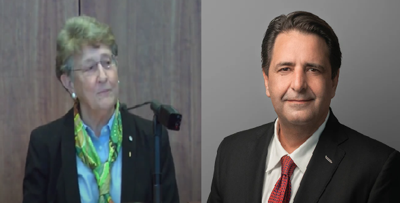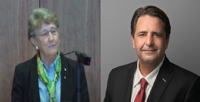
Jean Toal, left, and Peter Protopapas
COLUMBIA, S.C. - A U.K. company is begging the South Carolina Supreme Court to intervene after the state’s asbestos judge approved a settlement that sends money into a secret trust controlled by a plaintiff attorney who can disburse the funds as he sees fit.
That attorney, Peter Protopapas, for the first time revealed he has collected some $100 million from insurance companies in a process engineered by Judge Jean H. Toal to extract money from decades-old insurance policies issued to now-defunct companies that sold asbestos products.
Judge Toal grants Protopapas a third of whatever he collects, with the rest going into confidential trusts, some of them incorporated in Delaware, that can disburse funds to lawyers or asbestos claimants.
Judge Toal last week approved yet another trust, this time funded by a settlement with mining giants Anglo American and De Beers. Protopapas sued the companies in the name of Cape Intermediate Holdings, a unit of U.K.-based Altrad Group, claiming they conspired with Cape to evade U.S. asbestos liabilities.
But Cape has fought back, arguing Judge Toal has no jurisdiction over the company, which has never operated in South Carolina, and Protopapas has no authority to act in Cape’s name.
“The putative receivership is a nullity as a matter of law, and the circuit court lacks jurisdiction take any action in this matter,” Cape said in a recent filing with the South Carolina Supreme Court. The U.K. High Court of Justice agrees, having issued a global injunction and $1.3 million fine against Protopapas for meddling in Cape’s affairs.
Protopapas, in his own court filing, accused Cape and Altrad of engaging in “propaganda messaging in order to avoid addressing the merits of the claims against them.”
Adding to the confusion, Judge Toal may have inadvertently ended Protopapas’s receivership last week. Her Oct. 30 order approving the settlement between Cape and De Beers also rescinded an earlier one appointing Protopapas receiver. That order was itself an attempt to correct a previous error, when the plaintiff who supposedly requested the receiver had actually settled all litigation against the company months before.
Judge Toal has so far rejected any challenges to her authority, referring to the American Revolution in a recent hearing as reason to ignore any court rulings coming out of the U.K. She has also sanctioned defendants for appealing her orders, telling a lawyer for Altrad in an October hearing: “Every action that's taken, whether you have the authority to appeal or not, you have appealed and tried to stop the court from moving forward with the ordinary course of handling this matter.”
Protopapas told the court he is establishing the South Carolina Asbestos Victims Qualified Settlement Fund to compensate “injured South Carolina workers.” The fund will cover claims against Cape, he said, although the governing documents give him complete discretion to pay anyone associated with litigation as well as any judgments against him.
Since Judge Toal has ordered all such funds to remain secret, it will not be known if any of the money will go to asbestos claimants, as opposed to plaintiff lawyers. Judge Toal granted lawyers a third of the fund, including the New York firm Morgan Lewis and Murrell Smith, the Republican Speaker of the South Carolina House of Representatives.
Protopapas lifted the veil of secrecy over these funds a bit in a recent filing, saying almost $100 million in insurance money has been paid out to “asbestos cancer victims and their families” through receivership operations, without disclosing his own take. He also criticized people who “allude to some nefarious reason behind sealing a confidential settlement agreement,” and the “continued sniping” of Altrad’s lawyers.
He accused Atrad of “distributing propaganda, threatening the receiver, its lawyers, and the courts through international proceedings with criminal and monetary penalties to coerce the immediate halt of this litigation.” The U.K. court, in addition to fining Protopapas, threatened him with criminal action if he persists in acting in Cape’s name. Protopapas didn’t participate in the U.K. proceedings.
When served with papers in the U.K. case at his South Carolina office, Protopapas “slammed the door in my face and told me not to come back,” the process server said.
Judge Toal held a trial last week in which Protopapas presented evidence Cape, De Beers and Anglo American had conspired in the 1950s through the 1970s to evade asbestos liability in U.S. courts. Cape, once a major asbestos producer in South Africa, stopped selling asbestos in the early 1980s and was purchased by Altrad in 2017.
The company previously had established a trust in England to pay asbestos claimants there, but a U.K. court rejected any claims by U.S. plaintiffs against the firm.
Protopapas and Toal have ignored that U.K. court ruling, instead claiming Protopapas is the legal representative of Cape authorized to accept service of lawsuits and file suits itself, as he did against Anglo American, De Beers and Altrad. Cape has not participated in the South Carolina proceedings, although Altrad’s lawyers have made court filings.
Judge Toal has said she will announce her verdict in the case against Altrad, the remaining defendant, later this month. The South Carolina Supreme Court also is expected to rule on Altrad’s emergency petition to halt the litigation later this month.




